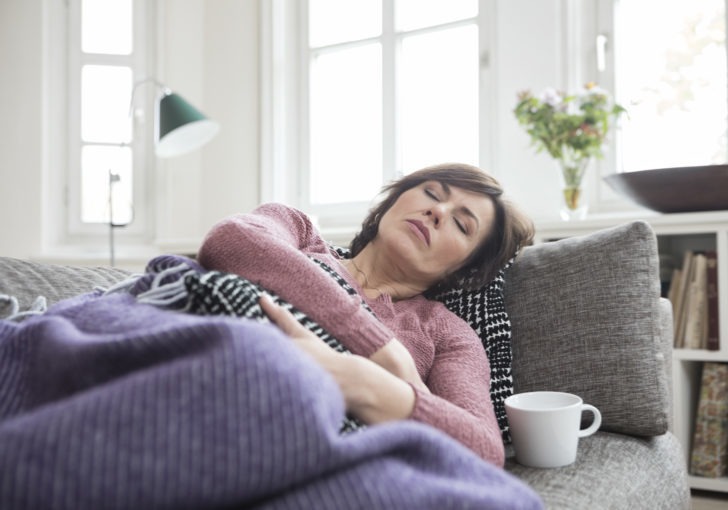Periods for women and teens can be uncomfortable, irritating and even painful. Johnna Nynas, M.D., discusses ways to alleviate the discomfort both naturally and medically.
Although not all women react exactly the same, Dr. Nynas of Sanford Health recommends a few remedies that are most common and most effective for patients experiencing period pain.
Natural treatment
Dr. Nynas said an important part of finding the right treatment is clarifying what makes the period so intense. Is it heavy blood flow? Is it length of cycle? Or is it cramping?
Depending on the woman and what’s causing period problems, treatment options vary.
A normal period typically lasts up to about seven days with 21-35 days separating each period cycle. “Some women are lucky and have periods that last only a couple days,” said Dr. Nynas. “Other women can have bleeding up to a week and that’s common. But if you’re bleeding 10 or more days, that’s not normal.”
To help with heavy bleeding and cramping, Dr. Nynas recommends over-the-counter medication and said ibuprofen is a good place to start.
“If patients can tolerate ibuprofen, I have them take 600 milligrams every six hours for the first four days of their period,” she said. “That alone has been shown to decrease menstrual flow and cramping up to 25%.”
“Other comfort cares really depend on the woman,” Dr. Nynas said. Many patients find comfort in heating pads, massages and light exercise such as walking or yoga, she added.
“If that’s not completely covering the symptoms, then we get into hormonal modulations by adding some type of estrogen or progesterone to help regulate the menstrual cycle,” Dr. Nynas said.
Hormonal treatment
Dr. Nynas said patients are most satisfied with some kind of hormonal regulation when trying to ease period discomfort. “I think they have the greatest success rates,” she said.
Hormonal contraception is not only a form of birth control but also a way to treat cramping and pain associated with periods. All types of hormonal contraception thin the lining of the uterus, which lightens the flow and eases discomfort.
Although there are many myths tied to taking contraception for regulating hormones, Dr. Nynas said it’s a safe and effective way to ease period discomfort.
“I spend a lot of time dispelling a lot of rumors about birth control methods and what they do,” she said.
Dr. Nynas said that even though some methods may have unwanted side effects, they are safe for patients.
Contraception methods that ease period issues
Intrauterine devices (IUDs) are small and flexible plastic inserts placed in the uterus by a health professional that last three to five years. “This method eases menstrual flow and is also an effective contraception,” said Dr. Nynas. She also said that many myths are associated with IUDs, such as horrible side effects. “That’s just not true. We have found through many years of research that these devices are not only very safe, but they’re very effective, and that’s why they are the most commonly recommended contraceptive and also the most commonly used contraceptive by OB-GYNs.” Dr. Nynas said IUDs are currently the most effective option that patients tend to be most satisfied with, especially for reducing heavy flow.
Contraceptive implant is a small rod that sits under the skin of a woman’s upper arm and is effective for up to four years. This method also lessens period pains.
Oral contraceptive pills are consumed daily by mouth and contain both estrogen and progestin. Contraceptive pills not only lighten period flow and ease discomfort, but they also regulate the menstrual cycle. However, some patients are sensitive to the estrogen in the pills, which can cause unwanted side effects such as nausea, headaches and mood swings. Dr. Nynas said that those symptoms are usually temporary, lasting only a couple months.
Hormonal injections such as Depo-Provera provide roughly 12 weeks of protection. The shot contains progestin, which lightens the period and eases cramps. After a couple of shots, many women lose their period altogether until they end the treatment method. However, Dr. Nynas warns that injections usually stimulate appetite, so weight gain is likely as well as irregular spotting or bleeding.
Vaginal rings are small, plastic rings inserted by the patient into the vagina every three weeks. After the third week, the patient removes the ring for the period to flow. Once the cycle and fourth week are complete, a new ring will replace the prior one. Vaginal rings lighten flow, which eases discomfort.
Contraceptive patch sticks on the arm and needs weekly replacing by the patient. It makes periods more regular, which can help ease pain and heavy bleeding.
Whether you choose a natural or hormonal approach to alleviating period discomfort, Dr. Nynas encourages patients to research and discuss the different methods with their providers as they affect women differently.
“What works well for one patient may not be the right choice for another patient,” she said.
Learn more
- Infrequent or absent periods may be potentially serious PCOS
- Choosing the right birth control
- A healthy life: Advice for women from their 20s to their 80s
…
Posted In Family Medicine, Gynecology, Women's
